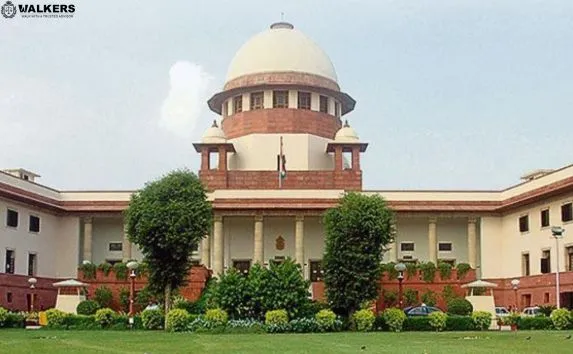

 Supreme Court Limits Use of Special Leave Jurisdiction to Bypass High Court, Citing Two Specific Situations
In a recent ruling on May 16, the Supreme Court emphasized that parties would no longer be permitted to utilize the special leave jurisdiction as a means to bypass available remedies at the High Court level, except in two specific circumstances [Jini Dhanrajgir & Anr v Shibu Mathew & Anr].
A Bench comprising Justices AS Bopanna and Dipankar Datta clarified that the top court will entertain Special Leave Petitions (SLP) directly, without approaching the High Court, solely when there is a substantial question of general importance or a related matter pending consideration.
"The discretionary power to grant leave under Article 136 implies that this Court will not allow a party to invoke the 'special leave' jurisdiction as a means of bypassing the remedies available at the High Court level, unless the aforementioned two situations are fulfilled," stated the order.
Supreme Court Dismisses Contempt Petition, Upholds Execution Court's Jurisdiction in Property Dispute Case
The Supreme Court recently heard a contempt petition seeking punishment for the respondents' deliberate disobedience of a top court order passed in a Special Leave Petition (SLP) that ultimately resolved a property dispute.
The SLP had effectively resolved the dispute between the parties, while slightly increasing the compensation awarded to the respondents, who were directed to surrender possession of the disputed property.
During the execution petition process, the High Court instructed the executing court to address the respondents' objections. Subsequently, the executing court found the objections to be valid and deemed it necessary to independently assess their merits after recording evidence.
The original plaintiff's daughter and son appealed against this interim order and also sought the removal of resistance by the respondents.
The central issue before the Supreme Court was whether interference with the common order under appeal was warranted.
After careful examination of the unique facts, the court concluded that an inquiry by the executing court was at least necessary.
Consequently, the Supreme Court dismissed the petitions, noting that there was no justification for its intervention, particularly since the order of the executing court had not been challenged before the High Court.
The court made it explicitly clear that the Executing Court should proceed to address the appellants' application under Rule 97 of Order XXI of the Civil Procedure Code (CPC), along with the respondents' objections, based on their own merits and without being influenced by any observations made in the present order, which were solely for the purpose of disposing of the appeals.
Senior Advocate Shyam Divan, Arvind Minocha, along with advocates George Cherian, Mayank Kshirsagar, Anshula Laroiya, and Abha Goel represented the petitioners.
Senior Advocate V Chitambaresh, Surendra Kumar, along with advocates TG Narayanan Nair, MT George, Susy Abraham, Johns George, C Venugopal, Sonal Gupta, and KV Mohan appeared for the respondents.
Supreme Court Limits Use of Special Leave Jurisdiction to Bypass High Court, Citing Two Specific Situations
In a recent ruling on May 16, the Supreme Court emphasized that parties would no longer be permitted to utilize the special leave jurisdiction as a means to bypass available remedies at the High Court level, except in two specific circumstances [Jini Dhanrajgir & Anr v Shibu Mathew & Anr].
A Bench comprising Justices AS Bopanna and Dipankar Datta clarified that the top court will entertain Special Leave Petitions (SLP) directly, without approaching the High Court, solely when there is a substantial question of general importance or a related matter pending consideration.
"The discretionary power to grant leave under Article 136 implies that this Court will not allow a party to invoke the 'special leave' jurisdiction as a means of bypassing the remedies available at the High Court level, unless the aforementioned two situations are fulfilled," stated the order.
Supreme Court Dismisses Contempt Petition, Upholds Execution Court's Jurisdiction in Property Dispute Case
The Supreme Court recently heard a contempt petition seeking punishment for the respondents' deliberate disobedience of a top court order passed in a Special Leave Petition (SLP) that ultimately resolved a property dispute.
The SLP had effectively resolved the dispute between the parties, while slightly increasing the compensation awarded to the respondents, who were directed to surrender possession of the disputed property.
During the execution petition process, the High Court instructed the executing court to address the respondents' objections. Subsequently, the executing court found the objections to be valid and deemed it necessary to independently assess their merits after recording evidence.
The original plaintiff's daughter and son appealed against this interim order and also sought the removal of resistance by the respondents.
The central issue before the Supreme Court was whether interference with the common order under appeal was warranted.
After careful examination of the unique facts, the court concluded that an inquiry by the executing court was at least necessary.
Consequently, the Supreme Court dismissed the petitions, noting that there was no justification for its intervention, particularly since the order of the executing court had not been challenged before the High Court.
The court made it explicitly clear that the Executing Court should proceed to address the appellants' application under Rule 97 of Order XXI of the Civil Procedure Code (CPC), along with the respondents' objections, based on their own merits and without being influenced by any observations made in the present order, which were solely for the purpose of disposing of the appeals.
Senior Advocate Shyam Divan, Arvind Minocha, along with advocates George Cherian, Mayank Kshirsagar, Anshula Laroiya, and Abha Goel represented the petitioners.
Senior Advocate V Chitambaresh, Surendra Kumar, along with advocates TG Narayanan Nair, MT George, Susy Abraham, Johns George, C Venugopal, Sonal Gupta, and KV Mohan appeared for the respondents.
Click Here to: Download/View Related File
TAGS: Supreme Court contempt petition willful disobedience top court order Special Leave Petition property dispute quietus compensation possession executing court objections interim order appeals interference executing court's jurisdiction dismissal inquiry High Court Civil Procedure Code senior advocates respondents.